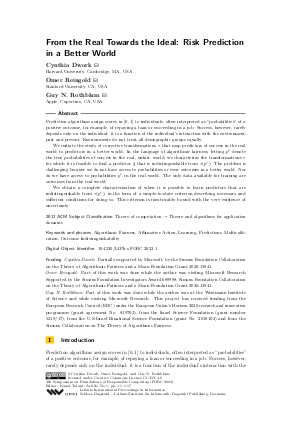From the Real Towards the Ideal: Risk Prediction in a Better World
Authors Cynthia Dwork, Omer Reingold, Guy N. Rothblum
-
Part of:
Volume:
4th Symposium on Foundations of Responsible Computing (FORC 2023)
Part of: Series: Leibniz International Proceedings in Informatics (LIPIcs)
Part of: Conference: Symposium on Foundations of Responsible Computing (FORC) - License:
 Creative Commons Attribution 4.0 International license
Creative Commons Attribution 4.0 International license
- Publication Date: 2023-06-04
File

PDF
LIPIcs.FORC.2023.1.pdf
- Filesize: 0.71 MB
- 17 pages
Document Identifiers
Subject Classification
ACM Subject Classification
- Theory of computation → Theory and algorithms for application domains
Keywords
- Algorithmic Fairness
- Affirmative Action
- Learning
- Predictions
- Multicalibration
- Outcome Indistinguishability
Metrics
- Access Statistics
-
Total Accesses (updated on a weekly basis)
0PDF Downloads0Metadata Views
Abstract
Prediction algorithms assign scores in [0,1] to individuals, often interpreted as "probabilities" of a positive outcome, for example, of repaying a loan or succeeding in a job. Success, however, rarely depends only on the individual: it is a function of the individual’s interaction with the environment, past and present. Environments do not treat all demographic groups equally. We initiate the study of corrective transformations τ that map predictors of success in the real world to predictors in a better world. In the language of algorithmic fairness, letting p^* denote the true probabilities of success in the real, unfair, world, we characterize the transformations τ for which it is feasible to find a predictor q̃ that is indistinguishable from τ(p^*). The problem is challenging because we do not have access to probabilities or even outcomes in a better world. Nor do we have access to probabilities p^* in the real world. The only data available for training are outcomes from the real world. We obtain a complete characterization of when it is possible to learn predictors that are indistinguishable from τ(p^*), in the form of a simple-to-state criterion describing necessary and sufficient conditions for doing so. This criterion is inextricably bound with the very existence of uncertainty.
Cite As Get BibTex
Cynthia Dwork, Omer Reingold, and Guy N. Rothblum. From the Real Towards the Ideal: Risk Prediction in a Better World. In 4th Symposium on Foundations of Responsible Computing (FORC 2023). Leibniz International Proceedings in Informatics (LIPIcs), Volume 256, pp. 1:1-1:17, Schloss Dagstuhl – Leibniz-Zentrum für Informatik (2023)
https://doi.org/10.4230/LIPIcs.FORC.2023.1
BibTex
@InProceedings{dwork_et_al:LIPIcs.FORC.2023.1,
author = {Dwork, Cynthia and Reingold, Omer and Rothblum, Guy N.},
title = {{From the Real Towards the Ideal: Risk Prediction in a Better World}},
booktitle = {4th Symposium on Foundations of Responsible Computing (FORC 2023)},
pages = {1:1--1:17},
series = {Leibniz International Proceedings in Informatics (LIPIcs)},
ISBN = {978-3-95977-272-3},
ISSN = {1868-8969},
year = {2023},
volume = {256},
editor = {Talwar, Kunal},
publisher = {Schloss Dagstuhl -- Leibniz-Zentrum f{\"u}r Informatik},
address = {Dagstuhl, Germany},
URL = {https://drops.dagstuhl.de/entities/document/10.4230/LIPIcs.FORC.2023.1},
URN = {urn:nbn:de:0030-drops-179224},
doi = {10.4230/LIPIcs.FORC.2023.1},
annote = {Keywords: Algorithmic Fairness, Affirmative Action, Learning, Predictions, Multicalibration, Outcome Indistinguishability}
}
Author Details
Funding
- Dwork, Cynthia: Partially supported by Microsoft, by the Simons Foundation Collaboration on the Theory of Algorithmic Fairness and a Sloan Foundation Grant 2020-13941.
- Reingold, Omer: Part of this work was done while the author was visiting Microsoft Research. Supported by the Simons Foundation Investigators Award 689988, Simons Foundation Collaboration on the Theory of Algorithmic Fairness and a Sloan Foundation Grant 2020-13941
- Rothblum, Guy N.: Part of this work was done while the author was at the Weizmann Institute of Science and while visiting Microsoft Research. This project has received funding from the European Research Council (ERC) under the European Union’s Horizon 2020 research and innovation programme (grant agreement No. 819702), from the Israel Science Foundation (grant number 5219/17), from the U.S-Israel Binational Science Foundation (grant No. 2018102) and from the Simons Collaboration on The Theory of Algorithmic Fairness.
References
-
Philip Dawid. On individual risk. Synthese, 194(9):3445-3474, 2017.

- Cynthia Dwork, Moritz Hardt, Toniann Pitassi, Omer Reingold, and Richard S. Zemel. Fairness through awareness. In Shafi Goldwasser, editor, Innovations in Theoretical Computer Science 2012, Cambridge, MA, USA, January 8-10, 2012, pages 214-226. ACM, 2012. URL: https://doi.org/10.1145/2090236.2090255.
-
Cynthia Dwork, Michael P Kim, Omer Reingold, Guy N Rothblum, and Gal Yona. Outcome indistinguishability. In Proceedings of the 53rd Annual ACM SIGACT Symposium on Theory of Computing, pages 1095-1108, 2021.

-
Virginia Eubanks. Automating Inequality: How High-Tech Tools Profile, Police, and Punish the Poor. St. Martin’s Press, Inc., USA, 2018.

- Moritz Hardt, Eric Price, and Nati Srebro. Equality of opportunity in supervised learning. In Daniel D. Lee, Masashi Sugiyama, Ulrike von Luxburg, Isabelle Guyon, and Roman Garnett, editors, Advances in Neural Information Processing Systems 29: Annual Conference on Neural Information Processing Systems 2016, December 5-10, 2016, Barcelona, Spain, pages 3315-3323, 2016. URL: https://proceedings.neurips.cc/paper/2016/hash/9d2682367c3935defcb1f9e247a97c0d-Abstract.html.
-
Ursula Hébert-Johnson, Michael Kim, Omer Reingold, and Guy Rothblum. Multicalibration: Calibration for the (computationally-identifiable) masses. In International Conference on Machine Learning, pages 1939-1948. PMLR, 2018.

- Lunjia Hu, Inbal Livni Navon, Omer Reingold, and Chutong Yang. Omnipredictors for constrained optimization. CoRR, abs/2209.07463, 2022. URL: https://doi.org/10.48550/arXiv.2209.07463.
- Michael J. Kearns, Seth Neel, Aaron Roth, and Zhiwei Steven Wu. Preventing fairness gerrymandering: Auditing and learning for subgroup fairness. In Jennifer G. Dy and Andreas Krause, editors, Proceedings of the 35th International Conference on Machine Learning, ICML 2018, Stockholmsmässan, Stockholm, Sweden, July 10-15, 2018, volume 80 of Proceedings of Machine Learning Research, pages 2569-2577. PMLR, 2018. URL: http://proceedings.mlr.press/v80/kearns18a.html.
- Jon Kleinberg, Sendhil Mullainathan, and Manish Raghavan. Inherent trade-offs in the fair determination of risk scores. arXiv preprint, 2016. URL: https://doi.org/10.48550/arXiv.1609.05807.
